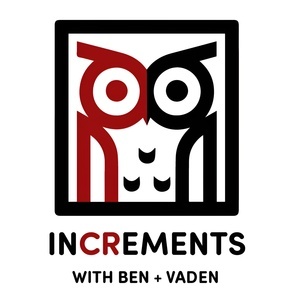Episode 40
#40 - The Myth of The Framework: On the possibility of fruitful discussion
May 30th, 2022
45 mins 31 secs
Tags
About this Episode
Is there any possibility of fruitful dialogue with your mildly crazy, significantly intoxicated uncle at Thanksgiving dinner? We turn to Karl Popper's essay, The Myth of the Framework, to find out. Popper argues that it's wrong to assume that fruitful conversation is only possible among those who share an underlying framework of beliefs and assumptions. In fact, there's more to learn in difficult conversations which lack such a framework.
We discuss
- What is The Myth of the Framework?
- The relationship between the myth of the framework and epistemological and moral relativism
- Modern examples of the myth, including Jon Haidt's recent Atlantic essay and Paul Graham's Keep your identity small.
- Why there's more to learn from conversations where the participants disagree, and why conversations with too much agreement are uninteresting
- Linguistic relativism and the evolution of language as a refutation of the myth
- The relationship between the myth of the framework and the Enigma of Reason
Quotes
I think what religion and politics have in common is that they become part of people's identity, and people can never have a fruitful argument about something that's part of their identity. By definition they're partisan.
- Paul Graham, Keep your identity small
The story of Babel is the best metaphor I have found for what happened to America in the 2010s, and for the fractured country we now inhabit. Something went terribly wrong, very suddenly. We are disoriented, unable to speak the same language or recognize the same truth. We are cut off from one another and from the past.
It’s been clear for quite a while now that red America and blue America are becoming like two different countries claiming the same territory, with two different versions of the Constitution, economics, and American history. But Babel is not a story about tribalism; it’s a story about the fragmentation of everything. It’s about the shattering of all that had seemed solid, the scattering of people who had been a community. It’s a metaphor for what is happening not only between red and blue, but within the left and within the right, as well as within universities, companies, professional associations, museums, and even families.
- Jonathan Haidt, Why the past 10 years of American life have been uniquely stupid
The proponents of relativism put before us standards of mutual understanding which are unrealistically high. And when we fail to meet these standards, they claim that understanding is impossible.
- Karl Popper, MotF, pg. 34The myth of the framework can be stated in one sentence, as follows. A rational and fruiful discussion is impossible unless the participants share a common framework of basic assumptions or, at least, unless they have agreed on such a framework for the purpose of the discussion.
As I have formulated it here, the myth sounds like a sober statement, or like a sensible warning to which we ought to pay attention in order to further rational discussion. Some people even think that what I describe as a myth is a logical principle, or based on a logical principle. I think, on the contrary, that it is not only a false statement, but also a vicious statement which, if widely believed, must undermine the unity of mankind, and so must greatly increase the likelihood of violence and of war. This is the main reason why I want to combat it, and to refute it.
- Karl Popper, MotF, pg. 34Although I am an admirer of tradition, and conscious of its importance, I am, at the same time, an almost orthodox adherent of unorthodoxy: _I hold that orthodoxy is the death of knowledge, since the growth of knowledge depends entirely on the existence of disagreement. Admittedly, disagreement may lead to strif, and even to violence. And this, I think, is very bad indeed, for I abhor violence. Yet disagreement may also lead to discussion, to argument, and to mutual criticism. And these, I think, are of paramount importance. I suggest that the greatest step towards a better and more peaceful world was taken when the war of swords was first supported, and later sometimes even replaced, by a war of words. This is why my topic is of some practical significance._
- Karl Popper, MotF, pg. 34
My thesis is that logic neither underpins the myth of the framework nor its denial, but that we can try to learn from each other. Whether we succeed will depend largely on our goodwill, and to some extent also on our historical situation, and on our problem situation.
- Karl Popper, MotF, pg. 38
References
- Why the past 10 years of American life have been uniquely stupid, by Jonathan Haidt
- Keep your identity small, by Paul Graham
- The Enigma of Reason by Hugo Mercier and Dan Sperber
- Glenn Loury and Briahna Joy Grey
- Normal Science and its Dangers
Social media everywhere
Follow us on twitter (@Incrementspod, @VadenMasrani, @BennyChugg), and on youtube.
Tell us about your shaken framework at incrementspodcast@gmail.com
Image: Cornelis Anthonisz (1505 – 1553) – The Fall of the Tower of Babel (1547)
Support Increments